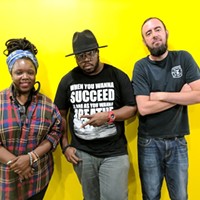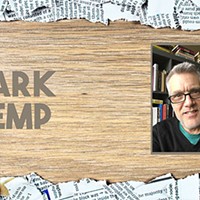Before Charlotte R&B legend Wilbert Harrison took his swinging version of "Kansas City" to No. 1 on the Billboard chart in 1959, he got his start rousing crowds in a two-story, Four Square-style Art Moderne building on Beatties Ford Road. The building still stands, a monument to the power and fortitude of a local black community that made gargantuan strides from the 1940s through the civil rights movement of the '60s and forward, meeting and planning and working for social change in the streetcar suburb of Washington Heights, in west Charlotte.
That building is, of course, the mythic Excelsior Club, which philanthropist, political activist and businessman Jimmie McKee opened in 1944. In its heyday, the Excelsior rocked Washington Heights on a daily basis, hosting political activists and musical stars from several different periods — Louis Armstrong and Nat King Cole in the jazz age, James Brown and the O'Jays during height of soul, funk and disco.
"The Excelsior Club was where it was at. It was a musical training ground," says jazz drummer Tim Scott, Jr., the artist in residence at Charlotte Center City Partners. He was a 14-year-old student at Northwest School of the Arts in the late 1990s when he first heard stories about the legendary club. Even by then, Excelsior veterans and then-current players would drop in to talk to Scott and his fellow music students.
"We all knew the musicians who were playing there every week," Scott remembers. "They would come and talk to us and give us guidance, give us lessons, give us information."
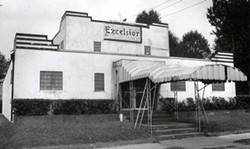
- The legendary Excelsior Club (Courtesy of Colette Forrest)
It only makes sense, then, that Scott and the other planners of the second annual Soul Junction Festival — which takes place September 15 and 16 on the campus of Johnson C. Smith University — would look to the west side's historic musical past for inspiration. This year's two-day event features a range of talent, from local DJ That Guy Smitty, local acoustic singer-songwriter Arsena Schroeder and noted local studio band the X Men, to singers Shelby J and Micki Miller, Grammy-winning bassist Derrick Hodge (who's played with major acts including Kanye West, Common, Jill Scott and Robert Glasper), neosoul singer Georgia Ann Muldrow, whose mother sang with the jazz great Pharoah Sanders, and Durham poet and rapper G Yamazawa. (See full schedule in sidebar on page 21.)
"[These genres] speak to a lot of different people — old, young," Alysia Osborne, CCCP's director of Historic West End, says. "We worked with [community] leaders to decide what kind of music they wanted to hear. Not so much who are the artists, but more what kind of vibe, flavor, or ambiance did we want to create in the community. They talked about jazz, soul, and rhythm & blues, and how it is multi-generational."
The point of the festival is to celebrate the west side of Charlotte, part of which has been renamed West End. Osborne is a key mover in branding the area in a way that retains the flavor of the neighborhood but brings it into the present. "Soul Junction was an idea that was about building the bonds on the history and culture of the area by celebrating the music," she says.
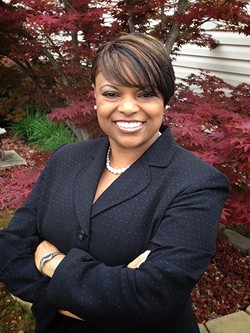
- Alysia Osborne (Photo by Garrick Osborne)
Quentin Talley, the founder and artistic director of OnQ Performing Arts, came up with the name. Soul Junction refers to the Five Points area where West Trade and West Fifth streets meet Rozelles Ferry and Beatties Ford roads next to Uptown. It symbolizes, Osborne says, "how these roads and this area is kind of a mosaic of people, but they all can come together around music. This is the junction of where soul can happen. It is where the city meets the village.
As Charlotte's central city expands outward into old neighborhoods, Osborne says, it's fundamental to understand "how these neighborhoods, the oldest African-American neighborhoods in the community, still have a lot of their original fabric; the original people with a lot of civil rights leaders still live in the area. A lot of the musicians that used to play at the Excelsior still live in the community and support this area."
Last year's Soul Junction festival was disappointing; few people showed up for it. But Osborne says things have changed this year. "Last year we had 20-plus acts. They had shorter sets," Osborne says. "This year we wanted to give people longer sets so people can really, really enjoy the artists." Two other important differences are the mix of musical styles and acts, and the addition of Scott as music supervisor and Talley as talent curator.
Scott says the musical line-up was central in maintaining the kind of understanding of the community that Osborne wants to emphasize. "We as a people are not monolithic," Scott says. "So if we are going to present something that is going to represent the neighborhood, we want to make sure we were not presenting something that's monolithic."
In other words, when people think black music, they may immediately think "hip-hop," or "R&B," or maybe "gospel." But the black community and its musical styles are so much larger than those simplistic tags.
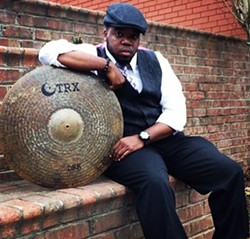
- Tim Scott (Photo by Sue McLester)
"I think sometimes when we look at a city, or communities, neighborhoods, or a group of people, it is often too easy to write everybody off into one category — to say, 'Oh well, this person looks like this, so they only like hip-hop.' That is a blanket statement," Scott says. "There are so many different elements to what hip-hop is. What I call hip-hop and what someone who lives next door to me who might be 19 years old, with a different set of life experiences from me, what he calls hip-hop may be completely different."
Even assessing musical quality is simplistic, Scott adds. "When you say good music, to me, my interpretation of what good music is could be something completely different from my sister, a person who I grew up with."
So Scott set out to book jazz, both smooth and crunchy; soul, both neo and old, along with some hip-hop flavoring. "Some of the best minds in production and hip-hop have come out of the JCSU music department," he says. "So, we had to represent that.
"And poetry, funk, R&B, folk — all of that has come from out of this community. We felt it was extremely important that we provided all of that to the community," Scott says.
The Soul Junction organizers generally succeeded, although there's a palpable scarcity of straight-up hip-hop — particularly of the local variety — and that's something the west side has plenty of, particularly in the music and rhymes of west side cheerleader Elevator Jay.
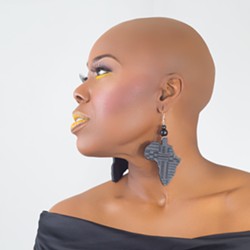
- Shelby J. (Courtesy of SoulJunction)
Still, the variety is impressive. Yamazawa is a National Poetry Slam champion; Funk Rush, as the band's name suggests, is a deeply funky outfit; Shelby J.'s R&B is as soulful as music gets; Muldrow performs more of a neosoul sound, and Schroeder plays an acoustic-based blend of folk and soul. And then there's the smooth, uptown jazz of 5th and York. On the hip-hop tip, it threads its way through Muldrow's soul, to the trapjazz of the Menastree, the funky grooves of the X Men and Hodge, and the house music of DJ Marcus Wade.
"We have a whole lot of other great local talent," Scott says. "Some of Charlotte's best talent is going to be showcased on the stage. And it's a free show." As for the non-local talent, he says the bigger names may attract people who don't know about the area's historic past. "The headliners are not a part of this city, per se, but people will come out to hear a Micki Miller and may not be all that familiar with the West End neighborhood," Scott says. "It is really a great opportunity to bring some good energy, and good attention to such a historic neighborhood."

- Micki Miller (Courtesy of SoulJunction)
"We are building on the audience from last year. We are reaching out to new people this year," Osborne adds. "The first few years we are really focused on building the audience and celebrating the artists. We want to keep it all about the music."
The late Excelsior founder Jimmie McKee would likely agree with Soul Junction's methodology, as names like James Brown are part of what brought new people to mingle with neighborhood residents in the past in a way that helped make social change happen.
"The club's growth has come because, from the very beginning, I've tried to give the best service I could," McKee said in a 1977 interview. "Not only to the members of the club, but to the community as well."
With caring overseers like Osborne, Scott, and Talley, Soul Junction may well keep that spirit alive for new generations of west Charlotte residents.
Watch Charlotte singer-songwriter Arsena Schroeder talk about why she's happy to bring her acoustic soul folk to Soul Junction.
Watch Durham emcee G. Yamazawa get poetic in his ode to Carolina, "North Cack."
Watch Georgia Anne Muldrow celebrate "Great Blacks."

